- Home
- Philip Roth
Operation Shylock Page 2
Operation Shylock Read online
Page 2
This and more like it lasted one hundred days and one hundred nights. If anyone had telephoned then to say that Philip Roth had been spotted at a war-crimes trial in Jerusalem or was advertised in the Jerusalem paper as lecturing at the King David Hotel on the only solution to the Jewish problem, I can’t imagine what I would have done. As thoroughly enveloped as I was in the disaster of self-abandonment, it might have furnished corroboratory evidence just unhinging enough to convince me to go ahead and commit suicide. Because I thought about killing myself all the time. Usually I thought of drowning: in the little pond across the road from the house … if I weren’t so horrified of the water snakes there nibbling at my corpse; in the picturesque big lake only a few miles away … if I weren’t so frightened of driving out there alone. When we came to New York that May for me to receive an honorary degree from Columbia, I opened the window of our fourteenth-floor hotel room after Claire had momentarily gone downstairs to the drugstore and, leaning as far out over the interior courtyard as I could while still holding tight to the sill, I told myself, “Do it. No snakes to stop you now.” But there was my father to stop me now; he was coming from New Jersey the next day to see me get my degree. Jokingly on the phone he’d taken to calling me “Doctor,” just as he’d done on the previous occasions when I was about to receive one of these things. I’d wait to jump until after he went home.
At Columbia, facing from the platform the several thousand people gathered festively together in the big sunny library plaza to watch the commencement exercises, I was convinced that I couldn’t make it through the afternoon-long ceremony without beginning either to scream aloud or to sob uncontrollably. I’ll never know how I got through that day or through the dinner welcoming the honorary-degree candidates the evening before without letting on to everybody who saw me that I was a man who was finished and about to prove it. Nor will I ever know what I might have gone ahead to do halfway out the hotel window that morning or even on the platform the next day, had I not been able to interpose between my denuded self and its clamorous longing for obliteration the devotion linking me to an eighty-six-year-old father whose life my death by suicide would smash to smithereens.
After the ceremony at Columbia, my father came back to the hotel with us for a cup of coffee. He’d surmised weeks before that something was critically wrong even though I insisted, when we saw each other or spoke on the phone, that it was only the persistence of the physical pain that was getting me down. “You look drained,” he said, “you look awful.” How I looked had made his own face go ashen—and he was as yet suffering from no fatal disease, as far as anyone knew. “Knee,” I replied. “Hurts.” And said no more. “This isn’t like you, Phil, you take everything in your stride.” I smiled. “I do?” “Here,” he said, “open it when you get home,” and he handed me a package that I could tell he had encased himself in its bulky brown-paper wrapping. He said, “To go with your new degree, Doctor.”
What he gave me was a framed five-by-seven portrait photo taken by a Metropolitan Life photographer some forty-five years earlier, on the occasion of my father’s Newark district’s winning one of the company’s coveted sales awards. There, as I could barely remember him now, was the striving, undeflectable insurance man out of my early grade school years, conventionally stolid-looking in the American style of the Depression era: neatly knotted conservative tie; double-breasted business suit; thinning hair closely cut; level, steady gaze; congenial, sober, restrained smile—the man that the boss wants on his team and that the customer can believe is a balanced person, a card-carrying member of the everyday world. “Trust me,” the face in the portrait proclaimed. “Work me. Promote me. You will not be let down.”
When I telephoned from Connecticut the next morning, planning to tell him all too truthfully how the gift of that old picture had buoyed me, my father suddenly heard his fifty-four-year-old son sobbing as he hadn’t sobbed since his infancy. I was astonished by how unalarmed his reaction was to what must have sounded like nothing short of a complete collapse. “Go ahead,” he said, as though he knew everything I’d been hiding from him and, just because he knew everything, had decided, seemingly out of the blue, to give me that photograph picturing him at his most steadfast and determined. “Let it all out,” he said very softly, “whatever it is, let it all come out.…”
___
I’m told that all the misery I’ve just described was caused by the sleeping pill that I was taking every night, the benzodiazepine triazolam marketed as Halcion, the pill that has lately begun to be charged with driving people crazy all over the globe. In Holland, distribution of Halcion had been prohibited entirely since 1979, two years after it was introduced there and eight years before it was prescribed for me; in France and Germany, doses of the size I was taking nightly had been removed from the pharmacies in the 1980s; and in Britain it was banned outright following a BBC television exposé aired in the fall of 1991. The revelation—which came as less than a revelation to someone like me—occurred in January 1992, with a long article in The New York Times whose opening paragraphs were featured prominently on the front page. “For two decades,” the piece began, “the drug company that makes Halcion, the world’s best-selling sleeping pill, concealed data from the Food and Drug Administration showing that it caused significant numbers of serious psychiatric side effects.…”
It was eighteen months after my breakdown that I first read a comprehensive indictment of Halcion—and a description of what the author called “Halcion madness”—in a popular American magazine. The article quoted from a letter in The Lancet, the British medical journal, in which a Dutch psychiatrist listed symptoms associated with Halcion that he had discovered in a study of psychiatric patients who had been prescribed the drug; the list read like a textbook summary of my catastrophe: “… severe malaise; depersonalization and derealization; paranoid reactions; acute and chronic anxiety; continuous fear of going insane; … patients often feel desperate and have to fight an almost irresistible impulse to commit suicide. I know of one patient who did commit suicide.”
It was only through a lucky break that instead of having eventually to be hospitalized myself—or perhaps even buried—I came to withdraw from Halcion and my symptoms began to subside and disappear. One weekend early in the summer of 1987, my friend Bernie Avishai drove down from Boston to visit me after having become alarmed by my suicidal maunderings over the phone. I was by then three months into the suffering and I told him, when we were alone together in my studio, that I had decided to commit myself to a mental institution. Holding me back, however, was my fear that once I went in I’d never come out. Somebody had to convince me otherwise—I wanted Bernie to. He interrupted to ask a question whose irrelevance irritated me terribly: “What are you on?” I reminded him that I didn’t take drugs and was “on” nothing, only some pills to help me sleep and to calm me down. Angered by his failure to grasp the severity of my situation, I confessed the shameful truth about myself as forthrightly as I could. “I’ve cracked up. I’ve broken down. Your friend here is mentally ill!” “Which pills?” he replied.
A few minutes later he had me on the phone to the Boston psychopharmacologist who just the previous year, I later learned, had saved Bernie from a Halcion-induced breakdown very much like mine. The doctor asked me first how I was feeling; when I told him, he, in turn, told me what I was taking to make me feel that way. I refused at first to accept that all this pain stemmed simply from a sleeping pill and insisted that he, like Bernie, was failing to understand the ghastliness of what I was going through. Eventually, with my permission, he telephoned my local doctor and, under their joint supervision, I began that night to come off the drug, a process that I wouldn’t care to repeat a second time and that I didn’t think I’d live through the first. “Sometimes,” the Dutch psychiatrist, Dr. C. van der Kroef, had written in The Lancet, “there are withdrawal symptoms, such as rapidly mounting panic and heavy sweating.” My withdrawal symptoms were unremitting for seventy-two
hours.
Elsewhere, enumerating the cases of Halcion madness that he had observed in the Netherlands, Dr. van der Kroef remarked, “Without exception, the patients themselves described this period as hell.”
___
For the next four weeks, feelings of extreme vulnerability, though no longer quite disemboweling me, still chaperoned me everywhere, especially as I was virtually unable to sleep and so was bleary with exhaustion throughout the day and then, during the insomniac, Halcionless nights, weighed down by the leaden thought of how I had disgraced myself before Claire and my brother and those friends who had drawn close to us during my hundred miserable days. I was abashed, and a good thing it was, too, since mortification seemed to me as promising a sign as any of the return of the person I formerly had been, more concerned, for better or worse, with something as pedestrian as his self-respect than with carnivorous snakes needling through the mud floor of his pond.
But much of the time I didn’t believe it was Halcion that had done me in. Despite the speed with which I recovered my mental, then my emotional equilibrium and looked to be ordering daily life as competently as I ever had before, I privately remained half-convinced that, though the drug perhaps intensified my collapse, it was I who had made the worst happen, after having been derailed by nothing more cataclysmic than a botched knee operation and a siege of protracted physical pain; half-convinced that I owed my transformation—my deformation—not to any pharmaceutical agent but to something concealed, obscured, masked, suppressed, or maybe simply uncreated in me until I was fifty-four but as much me and mine as my prose style, my childhood, or my intestines; half-convinced that whatever else I might imagine myself to be, I was that too and, if the circumstances were trying enough, I could be again, a shamefully dependent, meaninglessly deviant, transparently pitiable, brazenly defective that, deranged as opposed to incisive, diabolical as opposed to reliable, without introspection, without serenity, without any of the ordinary boldness that makes life feel like such a great thing—a frenzied, maniacal, repulsive, anguished, odious, hallucinatory that whose existence is one long tremor.
And am I half-convinced still, five years later, after all that the psychiatrists, newspapers, and medical journals have disclosed about the mind-altering wallop lurking for many of us in Upjohn’s magic little sleeping pill? The simple, truthful answer is, “Why not? Wouldn’t you be, if you were me?”
___
As for the Philip Roth whom I had spoken with in suite 511 of the King David Hotel and who most certainly was not me—well, what exactly he was after I had no idea, for instead of answering when he’d asked my name, I’d immediately hung up. You shouldn’t have phoned in the first place, I thought. You have no reason to be interested and you mustn’t be rattled. That would be ridiculous. For all you know, it’s simply someone else who happens coincidentally to bear the same name. And if that’s not so, if there is an impostor in Jerusalem passing himself off as you, there’s still nothing that needs to be done. He’ll be found out by others without your intervening. He already has been—by Apter and Aharon. Enough people know you in Israel to make it impossible for him not to be exposed and apprehended. What harm can he do you? The harm can only be done by you, going off half-cocked and impulsively making phone calls like this one. The last thing for him to know is that his hoax is bugging you, because bugging you has to be at the heart of whatever he is ostensibly trying to do. Aloof and unconcerned, for now at least, is your only—
This is how rattled I was already. After all, when he’d so matter-of-factly announced to me who he was I had only to tell him who I was and to see what then transpired—it might have been eye-opening and could even have been fun. My prudence in hanging up seemed, moments afterward, to have been nothing but the expression of helpless panic, a jolting indication that, nearly seven months after coming off Halcion, I might not be detraumatized at all. “Well, this is Philip Roth, too, the one who was born in Newark and has written umpteen books. Which one are you?” I could so easily have undone him with that; instead it was he who undid me merely by answering the phone in my name.
___
I decided to say nothing about him to Claire when I arrived in London the following week. I didn’t want her to think that there was anything in the offing with the potential to seriously disconcert me, particularly since she, for one, didn’t yet seem convinced that I had recovered sufficient strength to ride out an emotional predicament at all complex or demanding … and what was more to the point, when I was suddenly less than a hundred percent sure myself. Once I’d arrived in London I didn’t even want to remember what Apter and Aharon had phoned New York to tell me. … Yes, a situation that I might well have lightheartedly treated as a source of entertainment only a year earlier, or as a provocation to be soundly dealt with, now required that I take certain small but deliberate precautionary measures to guard against my being thrown. I wasn’t happy to make that discovery, yet I didn’t know how better to keep this bizarre triviality from developing in my mind the way the bizarre had become so painfully magnified under the sway of the Halcion. I would do what I must to maintain a reasonable perspective.
During my second night in London, still sleeping poorly because of jet lag, I began to wonder, after having popped awake in the dark for the third or fourth time, if those calls from Jerusalem—as well as my call to Jerusalem—had not perhaps occurred in dreams. Earlier that day I would have sworn that I had taken both calls at my desk in the hotel while I was sitting there beginning to work up the set of questions, based on my rereading of his books, that I intended to ask Aharon in Jerusalem, and yet, contemplating the unlikely content of the calls, I managed to convince myself during the course of that long night that they could have been placed and received only while I was asleep, that these were dreams of the kind that everyone dreams nightly, in which characters are identifiable and ring true when they’re speaking, while what they’re saying rings absolutely false. And the origin of the dreams was, when I thought about it, all too pathetically manifest. The imposturing other whose inexplicable antics I had been warned about by Apter and Aharon and whose voice I’d heard with my own ears was a specter created out of my fear of mentally coming apart while abroad and on my own for the first time since recovering—a nightmare about the return of a usurping self altogether beyond my control. As for the messengers bearing the news of my Jerusalem counterself, they too couldn’t have been any more grossly emblematic of the dreaming’s immediate, personal ramifications, since not only did their acquaintance with the unforeseen grotesquely exceed my own, but each had undergone the most tremendous transformation even before the clay of his original being had had time to anneal into a solid, shatterproof identity. The much-praised transfigurations concocted by Franz Kafka pale beside the unthinkable metamorphoses perpetrated by the Third Reich on the childhoods of my cousin and of my friend, to enumerate only two.
So eager was I to establish as fact that a dream had merely overflowed its banks that I got up to phone Aharon before it was even dawn. It was already an hour later in Jerusalem and he was a very early riser, but even if I had to risk waking him up, I felt I couldn’t wait a minute longer to have him confirm that this business was all a mental aberration of mine and that no phone conversation had taken place between the two of us about another Philip Roth. Yet, once out of bed and on the way down to the kitchen to call him quietly from there, I recognized what a pipe dream it was to be telling myself that I had only been dreaming. I ought to be rushing to telephone not Aharon, I thought, but the Boston psychopharmacologist to ask if my uncertainty as to what was real meant that three months of being bombarded chemically by triazolam had left my brain cells permanently impaired. And the only reason to be phoning Aharon was to hear what new sightings he had to report. But why not bypass Aharon and inquire directly of the impostor himself what exactly he was out to achieve? By feigning “a reasonable perspective” I was only opening myself further to a dangerous renewal of delusion. If there was any
place for me to be phoning at four fifty-five in the morning, it was suite 511 of the King David Hotel.
I thought very well of myself at breakfast for having made it back to bed at five without calling anyone; I felt settling over me that blissful sense of being in charge of one’s life, a man who once again hubristically imagines himself at the helm of himself. Everything else might be a delusion, but the reasonable perspective was not.
Then the phone rang. “Philip? More good news. You are in the morning’s paper.” It was Aharon calling me.
“Wonderful. Which paper this time?”
“A Hebrew paper this time. An article about your visit to Lech Walesa. In Gdansk. This is where you were before you came to attend the Demjanjuk trial.”
Had I been speaking to almost anyone else I might have been tempted to believe that I was being teased or toyed with. But however much pleasure Aharon may take in the ridiculous side of life, deliberately to perpetrate comic mischief, even of the most mildly addling variety, was simply incompatible with his ascetic, gravely gentle nature. He saw the joke, that was clear, but he wasn’t in on it any more than I was.
Across from me Claire was drinking her coffee and looking through the Guardian. We were finishing breakfast. I hadn’t been dreaming in New York and I wasn’t dreaming now.
Aharon’s voice is mild, very light and mild, modulated for the ears of the highly attuned, and his English is spoken precisely, each word lightly glazed with an accent as Old Worldish as it is Israeli. It is an appealing voice to listen to, alive with the dramatic cadences of the master storyteller and vibrant in its own distinctly quiet way—and I was listening very hard. “I’ll translate from your statement here,” he was telling me. “‘The reason for my visit to Walesa was to discuss with him the resettlement of Jews in Poland once Solidarity comes to power there, as it will.’”

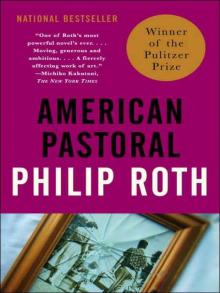 American Pastoral
American Pastoral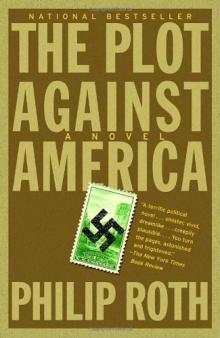 The plot against America
The plot against America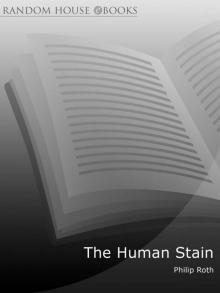 The Human Stain
The Human Stain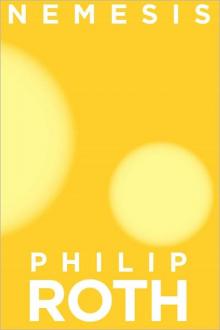 Nemesis n-4
Nemesis n-4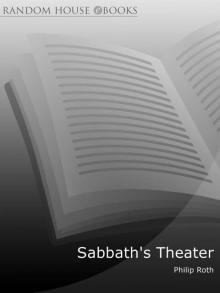 Sabbath’s Theater
Sabbath’s Theater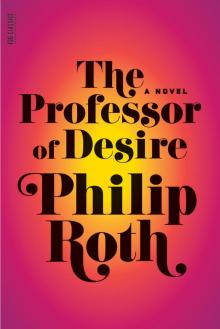 The Professor of Desire
The Professor of Desire Our Gang
Our Gang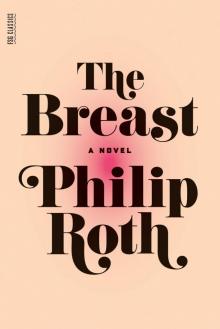 The Breast
The Breast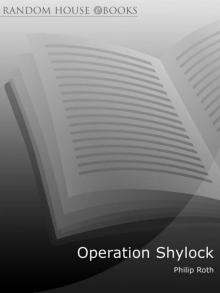 Operation Shylock
Operation Shylock The Dying Animal
The Dying Animal Letting Go
Letting Go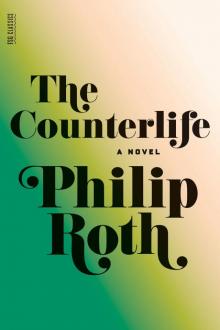 The Counterlife
The Counterlife Everyman
Everyman Nemesis
Nemesis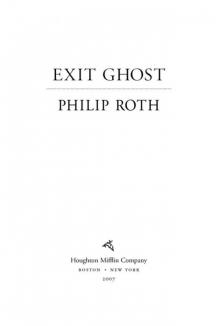 Exit Ghost
Exit Ghost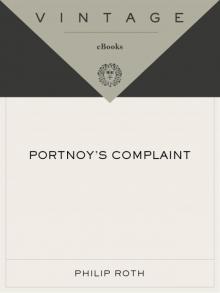 Portnoy's Complaint
Portnoy's Complaint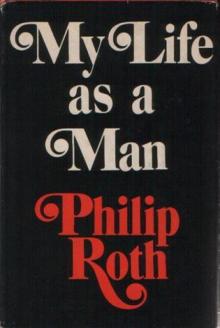 My Life as a Man
My Life as a Man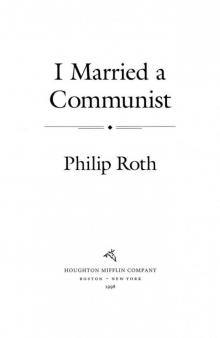 I Married a Communist
I Married a Communist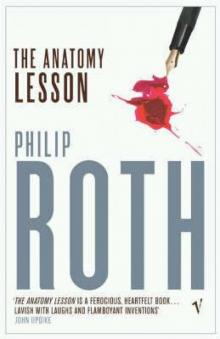 The Anatomy Lesson
The Anatomy Lesson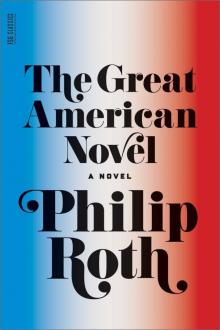 The Great American Novel
The Great American Novel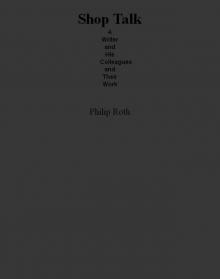 Shop Talk
Shop Talk The Humbling
The Humbling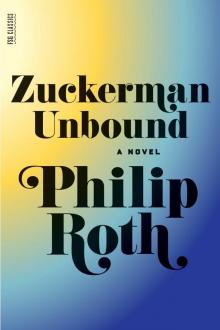 Zuckerman Unbound
Zuckerman Unbound When She Was Good
When She Was Good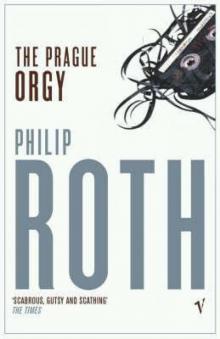 The Prague Orgy
The Prague Orgy American Pastoral (Nathan Zuckerman)
American Pastoral (Nathan Zuckerman) Goodbye, Columbus
Goodbye, Columbus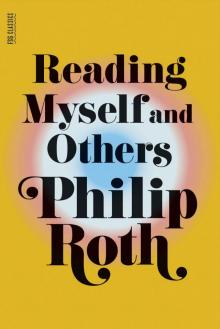 Reading Myself and Others
Reading Myself and Others